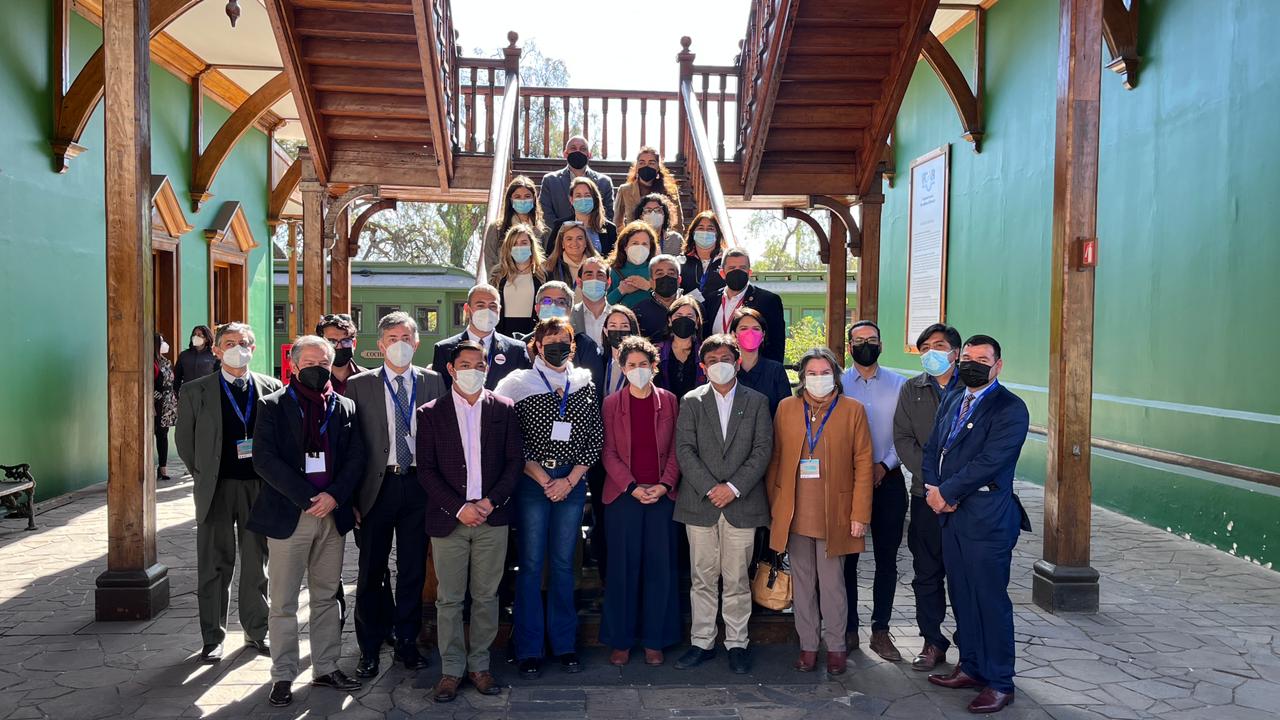Included in the Framework Law on Climate Change and focused on the development of green hydrogen, the PARCCs are key instruments for meeting national
climate targets.
Chile, 11 July 2022-. The fulfilment of national climate commitments requires commitment and action at both the national level and in the territories. In this framework, the regions of Magallanes, Chilean Antarctica, and Antofagasta have initiated the process of developing their Regional Climate Change Action Plans (PARCC) in two events held in Punta Arenas and Antofagasta on 8 and 11 July respectively. These events were led by Regional Governors Jorge Flíes and Ricardo Díaz, with the participation of the Minister of Environment, Maisa Rojas, and the main local authorities and institutions represented in the Regional Climate Change Commissions (CORECC).
The PARCCs, which will be developed in the framework of the support provided to Chile by the EUROCLIMA programme, are strategies included in Chile's recently enacted Framework Law on Climate Change, and they establish the measures and actions the territories will deploy for their adaptation and resilience to climate change.
The strategies of both regions will include as a centrepiece the development of green hydrogen, an essential fuel for the decarbonisation of the economy and the achievement of carbon neutrality by 2050, a target set forth in the Framework Law on Climate Change. In these regional plans, green hydrogen will be considered a tool for sustainable transformation, as well as a driver of local development and economy.
This was explained by the governors of both regions, Jorge Flies (Region of Magallanes and Chilean Antarctica) and Ricardo Díaz (Region of Antofagasta), who stressed the importance of climate action in the territories. "Last year Magallanes declared a climate emergency and today we have a national policy on climate change. For this reason, we wanted to work together to be able to have all the diagnoses," explained Flies. "Climate action is a challenge of change for everyone. In it, the regions are fundamental, because policies for addressing the consequences of climate change must necessarily be from the bottom up," said Díaz.
For her part, Minister Maisa Rojas stressed that the implementation of the Framework Law on Climate Change will be vital to fulfilling the commitment to be "the first ecological government in the history of Chile, which means building a new development model, where the focus of investments shifts towards inclusive and ecologically sustainable development, with people, their human rights, and ecosystems at the centre".
Likewise, the Ambassador of the European Union in Chile, León de la Torre, expressed in both activities that "the development of the PARCCs seeks to give continuity to the successful and fruitful cooperation in climate matters that the European Union has maintained with Chile in recent years, with the close support of the EUROCLIMA programme". He added that "to this end, the design of climate measures and actions appropriate to the regional reality will be supported, prioritising those that allow the sustainable development of the green hydrogen industry".
Also participating in the Magallanes and Antofagasta events were the Undersecretary of the Environment, Maximiliano Proaño; the Regional Presidential Delegate in Magallanes and Chilean Antarctica, Luz Bermúdez; the Regional Ministerial Secretaries (SEREMIS) of Environment and Energy in Magallanes and Antofagasta, Daniela Droguett, María Luisa Ojeda, Gustavo Riveros and Dafne Pino; and representatives of the GIZ and FIIAPP agencies on behalf of the EUROCLIMA Programme.
EUROCLIMA in the Chilean regions: the CORECCs
The Chilean Framework Law on Climate Change establishes that the Regional Climate Change Committees (CORECC) have the mission of promoting and facilitating low-carbon and climate change resilient development, through the preparation of the PARCCs, an instrument that articulates and integrates climate change into other planning and development policies in each region.
The formation of these Committees began in 2017 and was completed in 2020 with their installation in the 16 regions of the country. The CORECCs are made up of the regional government, the presidential delegation, the regional Ministerial secretaries of most of the Ministries and the regional municipalities. They are chaired by the governor of the region.
The Chile-EUROCLIMA country dialogue defined the preparation of the PARCCs for the regions of Antofagasta, Magallanes, and Chilean Antarctica, along with other actions aimed at promoting the development of green hydrogen, incorporating financing strategies for the implementation of the PARCCs and facilitating collaboration between the Atlas of Climate Risks (ARClim), the European platform Copernicus, and the Climate Change Observatory.
The European Union, through its EUROCLIMA programme, has accompanied Chile - a strategic partner for promoting climate action in the region - in the updating of the Nationally Determined Contribution (NDC), the preparation of its Long-Term Climate Strategy (LTCS) and in its role as the Presidency of COP25 of the United Nations Framework Convention on Climate Change (UNFCCC) since 2019 and the road to COP26 in Glasgow.
About EUROCLIMA
EUROCLIMA is a programme funded by the European Union and co-financed by the German federal government through the Federal Ministry for Economic Cooperation and Development (BMZ), as well as by the governments of France and Spain through the Ministry of Foreign Affairs, European Union, and Cooperation.
The Programme's mission is to reduce the impact of climate change and its effects in 19 countries in Latin America and the Caribbean, promoting mitigation, adaptation, resilience and climate investment. It is implemented according to the "Spirit of Team Europe" under the synergistic work of seven agencies: the Spanish Agency for International Development Cooperation (AECID), the French Development Agency (AFD); the Economic Commission for Latin America and the Caribbean (ECLAC); Expertise France (EF); the International and Ibero-American Foundation for Public Administration and Policy (FIIAPP); the German Society for International Cooperation (GIZ) GmbH, and the UN Environment Programme (UNEP).
For more information:
This email address is being protected from spambots. You need JavaScript enabled to view it.
This email address is being protected from spambots. You need JavaScript enabled to view it.


